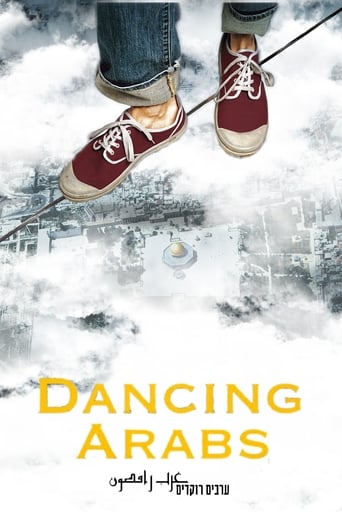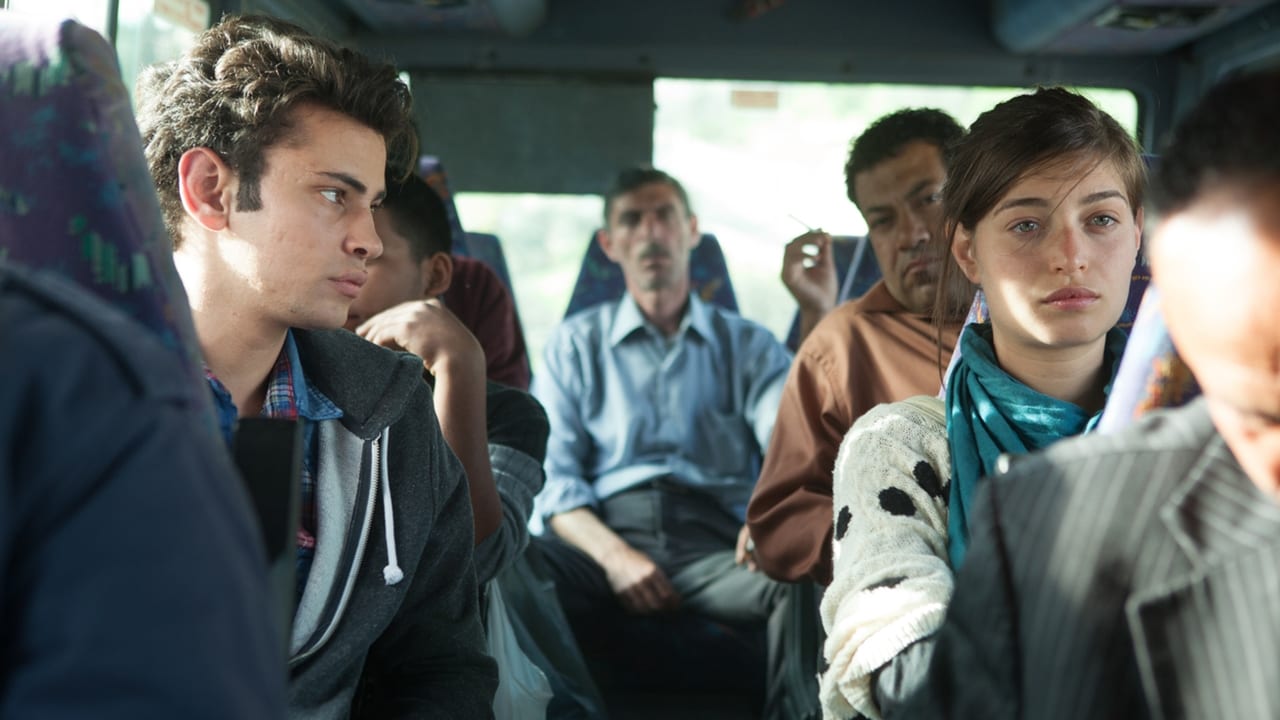Sonofamoviegeek
This movie has many good points and one obvious flaw. The good points are its production, acting and story. Dancing Arabs captures perfectly the Israel of each time it portrays and the two solitudes that Jews and Arabs live in. Israeli Arabs and Jews may have lived in the same land for 50 years (the years portrayed) but still don't trust or even respect each other. Today, the situation is even worse. That is the main message of the movie and the message comes across well and relatively unbiased.The flaw that keeps it from receiving a higher rating from me is the ending. It's fair enough that Eyad tries to escape the discrimination that Israeli Arabs suffer by taking the identity of his Jewish friend, Yonatan who dies from ALS. It's clever enough to "kill" Eyad by burying Yonatan as Eyad the Arab. Edna, Yonatan's mother goes along with this in her grief to have a son. The book must have some other tricks to make the deception work because people don't die in Israel without an official death certificate being registered. With Yonatan officially dead on state computers, Eyad would be caught sometime down the road when he tried to transact some kind of official business.My bet is that he would be caught on his way out of Israel to resume his German studies by the army's computer checking to see if he had done his National Service. The real Yonatan would have had an exemption because of his disability yet there he would be walking around ben Gurion Airport with a knapsack. This would not compute. I need to read the book to see how the author got around that one.
kolnoaMograbi
Wow. Not only is the script a seamless combination of Sayed Kashua's two novels (Second Person Singular and Dancing Arabs), but it's seamless in its own right. Eyad is such a sensitive character, as is Edna; both elicit our sympathy without our pity -- especially when Eyad "goes entrepreneurial" at school, capitalizing on his ability to straddle two worlds.I also liked the acerbic wink at coexistence efforts. Riklis nailed it.Great acting and camera work, excellent subtitling. The use of the word "previous" to illustrate Eyad's grappling with his Arab accent was spot on. I'm also gratified by the English title; "Borrowed Identity" expresses the plot line so much better than does "Dancing Arabs". Regarding the latter, I take issue with other reviewers who read symbolism into the title; in my view, it refers quite literally to Eyad's family dancing on the roof during the Scud attacks, a known occurrence. The fact that he declines to join them says it all.The relationship between Eyad and Yonatan was also done beautifully, showing how when dealing with severe disability, identities like "Jew" and "Arab" are dwarfed by more immediate, human concerns. The film did an excellent job of showing this. Highly recommended.
FilmCriticLalitRao
Director Eran Riklis is a filmmaker with great responsibilities on his shoulders. Although Arabs citizens are a minority in Israel, no special treatment is reserved for them. This aspect of Israeli society, its rules and regulations have been depicted by him in this film. It revolves around a young boy who has to make personal sacrifices in order to be accepted in Israeli society. It is no surprise that his life undergoes major upheavals when he is accepted with some reticence, reservations in a prestigious boarding school in Jerusalem. It is not a generalization when it is said that anybody can face issues related to culture, identity and language. If watched from this perspective, 'Dancing Arabs' is neither 100% pro Arab nor 100% anti Israel. "What does it mean to be an Arab in Israel ?" This key questions emanates from this film. 'Dancing Arabs' was the opening film during 19th International Film Festival of Kerala. Its lead actor Tawfik Barhom was the darling of the local media in Kerala state of India for more than a week. Before him, no other actor from Israeli cinema managed to become so popular.
maurice yacowar
Eran Riklis manages a touching humanist film that should engage and expand both sides of the Arab/Jewish divide in Israel — and beyond.It follows a bright young Arab boy Eyad, whose intelligent father — consigned by his earlier political activity to a career as fruit-picker — gets him into the country's premier Jewish high school. With that family as its centre the film obviously reveals the Arabs' difficulties in the (understandably) wary Jewish country. The Arabs make up 20% of the population, so they understandably chafe at soldiers checking their IDs and teachers' snide remarks and the conviction the system is prejudiced against them. Arabs steam in the kitchen while the Jewish boys get the better paying jobs as waiters. As Eyad's father summarizes it, "We want to live in dignity." Eyad's experience broadens when a community service project leads him into a friendship with Ionathan, a Jewish boy crippled with MS. He also has an affair with a bright, pretty Jewish student, Naomi, whose parents pull her out of the school to end their contact. To enable her to return, Eyad gallantly leaves the special school and studies for his exams on his own, while working in restaurants. His father disowns him in anger and disappointment.Riklis is careful to present the Jews' perspective as well. An Arab teacher teaches the map of Palestine — denying Israel — then unrolls the Israel map when the Jewish principal enters. Eyad's father and friends are certain Saddam Hussein will repel the US attack and destroy Israel in a few days. His mother knows better. The Arabs dance on their rooftops when they see the scud missiles fired at Israel.But that image does not explain the title. As Riklis told the Palm Springs festival audience, he had two other contexts in mind. Mainly the phrase suggests the Arabs' restriction to servicing (figuratively: dancing for) the Jews, whether in the kitchens or cleaning up their mess (as Eyad more heroically does for his stricken Jewish friend). He also recalled the Jewish proverb about not being able to swing one behind at two weddings at the same time. Servant Eyad is indeed torn between two dances, the Arab and the Jewish, when he ventures beyond his enclave. At school his summary of the 1948 war is the Jewish version, unshaded, but in a later discussion of Jewish contemporary fiction he details the conventions of Arab stereotypy.The two boys' mothers provide the film's moral center. Eyad's Arab mother — who has the stereotype Jewish nose — tacitly supports her son's love affair with the Jewish girl. Her concerns give way to her love and support. Ionathan's mother embraces Eyad for the comfort and life he brings her worsening son. When Ionathan nears the end, Eyad uses his passport to assume his Jewish identity, getting a waiter's job, then opens a bank account in his name to deposit the checks. Ionathan's mother is initially disturbed to discover that ploy, but when she confronts him she immediately softens at his need and promises to keep his secret. In response Eyad writes the high school exams both in his own name and in Ionathan's, securing both their graduations with identical honours. Eyad loses his beloved grandmother. Naomi denies him to win a spot on the Special Intelligence army unit. Eyad goes to university in Berlin, returning for Ionathan's last days. Then comes the film's astonishing climax. It's completely unexpected and yet perfectly inevitable. Ionathan's mother gives her son a Muslim burial under Eyad's name, to enable Eyad to pursue his life under her son's name, freed from the stigma of being an Arab. As Eyad's mother accepted her son having a Jewish lover, Ionathan's embraced her son's Arab friend. She asks him to live with them to ease her strain. Her climactic gesture reverses but fulfills the remarkable prophecy by Golda Meir: There will not be peace until the Arabs decide they love their children more than they hate the Jews. Both boys mothers' realize that; Naomi's doesn't. The message is that peace will be impossible unless both sides abandon their traditions of hatred and war. This Jewish mother abandons her religious tradition, turns her back on the past, to ensure a better future for the next generation of Jew and Arab together. We know her feeling for her Judaism from their sabbath dinner with Eyad. So we gauge the sacrifice she makes for her son's friend. Of course, in assuming the Jewish identity Eyad also abandons his past, including his family and culture. So profound is the schism that only a break with the past will bridge it. Eyad's elementary school is visited by a fatuous presenter of some Children for Peace movement. The film's climax plays out the deeper implications of that hope.


 AD
AD



